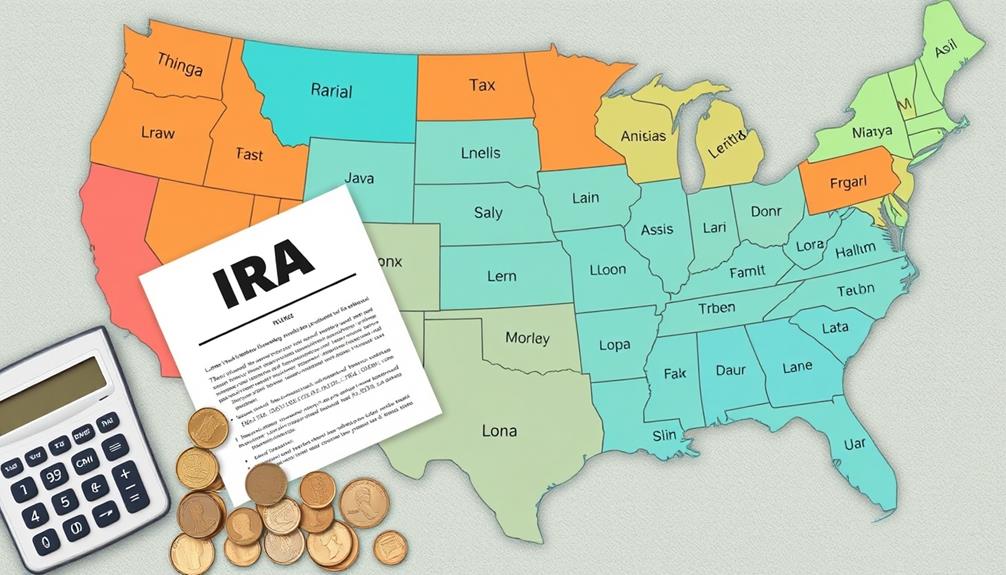Understanding the state tax implications of IRA withdrawals is crucial for retirement planning. Certain states treat traditional IRA withdrawals as ordinary income, while others may not tax them at all. States such as Florida and Texas do not have state income tax, which can benefit retirees. It is important to note that early withdrawals can result in penalties and extra taxes based on your state’s rules. Familiarizing yourself with local tax regulations will assist in managing tax obligations and maximizing retirement income. Exploring various options can help improve financial security.
Key Takeaways
- State tax treatment of IRA withdrawals varies; some states fully exempt retirement income, while others impose taxes on it.
- Understand your state's specific rules, as some impose additional penalties for early withdrawals.
- States like Florida and Texas have no personal income tax, benefiting retirees significantly during IRA withdrawals.
- Research state exemptions for pension income, which can enhance overall retirement income and reduce tax liability.
- Be aware of how Social Security benefits are taxed in your state, as this affects overall retirement planning.
Overview of IRA Types

When it comes to retirement savings, understanding the different types of Individual Retirement Accounts (IRAs) is essential. A Traditional IRA allows you to make contributions with pre-tax dollars, resulting in tax-deferred growth until you make withdrawals. When you do withdraw, those amounts are taxed as ordinary income.
On the other hand, a Roth IRA account is funded with after-tax dollars, meaning qualified withdrawals, including earnings, are tax-free after you reach age 59½ and have held the account for at least five years. Additionally, diversifying your retirement portfolio with options like a Gold IRA can provide a hedge against inflation and economic downturns, enhancing your long-term financial strategy.
Gold IRAs offer benefits that can complement traditional retirement accounts.
If you're self-employed or a small business owner, consider a SEP IRA, which offers higher contribution limits while maintaining similar tax implications as a Traditional IRA. For small businesses, SIMPLE IRAs enable employee contributions with employer matching, providing tax-deferred growth until you take out funds.
When it comes to inherited IRAs, be aware that they come with unique tax rules and distribution requirements that depend on both the original account owner's IRA type and your relationship to them. Understanding these different accounts helps you navigate your retirement strategy effectively.
Withdrawal Timing and Penalties

When you consider withdrawing from your IRA, timing is essential to avoid hefty penalties. Early withdrawals can hit you with a 10% penalty and impact your tax bracket, depending on your income for the year.
Additionally, understanding the legal and financial regulations governing IRA rollovers is important, as some states have their own rules that can complicate your withdrawal strategy even further.
Plus, some states have their own rules that can complicate your withdrawal strategy even further.
Early Withdrawal Penalties
Early withdrawals from your IRA can lead to significant financial penalties that you should be aware of. If you take money out of a Traditional IRA before age 59½, you'll face a 10% penalty on top of ordinary income tax. With a Roth IRA, you can withdraw your contributions anytime without penalties, but earnings may incur penalties if taken out before five years and age 59½. SIMPLE IRA distributions taken within the first two years carry an even steeper 25% penalty.
Here's a quick overview of early withdrawal penalties:
| IRA Type | Early Withdrawal Penalty | Conditions for Exceptions |
|---|---|---|
| Traditional | 10% | Disability, first-time home purchase, medical expenses |
| Roth | Penalties on earnings | Must be over 59½ and account open for 5 years |
| SIMPLE | 25% | No exceptions in the first two years |
| State Tax | Varies | Check local regulations |
| Reporting | Form 1040 + Form 5329 | Additional taxes may apply |
Understanding these penalties and state tax implications is essential for smart financial planning.
Timing Impact on Taxes
The timing of your IRA withdrawals plays an essential role in determining your tax liability. If you withdraw money from a traditional IRA during a high-income year, you might find yourself pushed into a higher tax bracket.
Remember, traditional IRA withdrawals are fully taxable as ordinary income, and if you take money out before age 59½, you'll face a 10% penalty on top of regular taxes, unless you qualify for an exception.
Additionally, some investors choose to diversify their retirement savings with options like specialized Gold IRAs that can offer unique tax advantages and investment opportunities.
On the other hand, Roth IRAs allow you to withdraw your contributions tax-free at any time, but you must meet the five-year rule and age requirement for tax-free earnings.
Additionally, be mindful of Required Minimum Distributions (RMDs), which must start at age 73 for traditional IRAs. Failing to withdraw the required amount can lead to a hefty 25% penalty on the shortfall.
Lastly, don't forget about state tax regulations, as these can vary greatly and may impose additional taxes or penalties on your withdrawals.
Understanding the timing impact on taxes is essential for effective retirement planning.
State-Specific Withdrawal Rules
Maneuvering state-specific withdrawal rules for IRAs can be a complex task, as each state has its own approach to taxing retirement income. Some states fully exempt retirement income from taxes, while others impose varying rates, impacting your overall tax liability.
Understanding common financial terms like credit scores can also be beneficial, as they may play a role in your overall financial strategy when planning withdrawals. When considering IRA withdrawals, it's vital to understand how your state treats traditional IRAs, as these withdrawals are generally taxed as ordinary income.
Additionally, certain states impose extra penalties on early withdrawals, further complicating the tax implications of accessing your funds before reaching retirement age. If you're planning your retirement income strategy, keep in mind that some states don't tax Social Security benefits, which can influence how you manage your IRA withdrawals to minimize your overall tax burden.
Navigating these state-specific rules is essential for effective financial planning. By being aware of the different state tax rules, you can make informed decisions about when and how to withdraw from your IRAs.
This proactive approach will help you manage your tax liability and maximize your retirement income, ensuring a smoother change into your retirement years.
State-Specific Tax Regulations

When planning your IRA withdrawals, it's crucial to evaluate how your state taxes retirement income. Some states may fully exempt these withdrawals, while others treat them as ordinary income, leading to significant tax implications.
Understanding state-specific tax regulations can help you navigate these differences. Staying informed about state-specific compliance requirements can help you maximize your retirement benefits and minimize your tax burden.
Retirement Income Taxation
Steering through state-specific tax regulations on retirement income can feel overwhelming, but it's vital for retirees to understand how their IRA withdrawals will be taxed.
Retirement income taxation varies greatly from state to state. Some states, like Florida and Texas, don't impose a personal income tax, making them attractive for retirees. Additionally, states with no state tax on retirement income can help maximize your financial resources during retirement, providing insightful guidance on gold investment strategies.
On the other hand, some states have specific state tax rules that may tax IRA withdrawals at varying rates or caps. It's also important to note that 39 states don't tax Social Security benefits, enhancing your total retirement income.
If you've got pension income from defined benefit plans, you're in luck—17 states exempt this type of income from taxation.
However, be cautious; some states might impose additional taxes on withdrawals from qualified retirement plans, including 401(k) accounts. Understanding these nuances can greatly impact your retirement finances.
Make sure you familiarize yourself with your state's tax laws to make informed decisions about your IRA withdrawals and overall retirement income strategy. This knowledge can help you maximize your financial resources during retirement, allowing you to enjoy your golden years with peace of mind.
Exemptions for Withdrawals
While traversing state tax regulations on IRA withdrawals, you might find that certain exemptions can considerably lighten your tax burden. Many states, like Florida, Texas, and Wyoming, don't impose any state income tax on IRA withdrawals, which is a significant advantage for retirees.
Additionally, states such as Illinois and Pennsylvania offer exemptions specifically for retirement income, including IRA withdrawals, allowing you to enjoy substantial tax savings. Understanding the investment strategies in precious metals can also help you optimize your retirement portfolio for tax efficiency.
In some cases, nine states, including New Hampshire and Tennessee, only tax interest and dividends while exempting IRA withdrawals altogether. This creates a favorable environment for retirees looking to maximize their retirement income.
Furthermore, if you're a military retiree, you may benefit from specific exemptions regarding military retirement income, enabling you to withdraw from your IRAs without facing state tax implications.
It's essential to understand how your state treats traditional and Roth IRA withdrawals, as this can impact your overall tax liability. Familiarizing yourself with these state-specific exemptions can help you strategize your withdrawals effectively, ensuring you keep more of your hard-earned retirement funds.
State-Specific Compliance Requirements
Understanding state-specific compliance requirements for IRA withdrawals is essential for effective retirement planning. State tax regulations differ greatly across the country, directly impacting your retirement income.
While states like Florida and Texas don't impose an income tax, providing valuable tax advantages for retirees, others, such as California and New York, tax IRA withdrawals as ordinary income. This variance can dramatically affect your overall tax liabilities during retirement.
Additionally, the growing focus on sustainability and responsible investing may influence how individuals allocate their retirement funds, particularly in states with specific tax incentives for ESG investments.
Furthermore, some states exempt Social Security benefits from taxation, further shaping the financial landscape for retirees. If you live in a state with strict income tax rules, understanding these regulations becomes even more important. Certain states may also have estate taxes or inheritance taxes that can impact your long-term financial strategy.
To navigate this complex environment, you must review your state's specific tax rules regarding IRA withdrawals. By doing so, you can optimize your retirement income and guarantee that you're prepared for any potential tax liabilities.
Taking the time to understand these compliance requirements can make a considerable difference in your financial well-being during your retirement years.
Exemptions for Retirement Income

When considering retirement income, it's important to know which states offer exemptions that can greatly impact your financial situation. Understanding the financial considerations for elderly care is vital as you plan for retirement.
Eight states don't impose personal income tax, making them attractive for retirees looking to maximize their IRA withdrawals and other retirement funds. Additionally, thirty-nine states exempt Social Security benefits from taxation, which can greatly enhance your overall retirement income and reduce financial burdens.
If you receive pension income, you'll be pleased to learn that seventeen states offer exemptions for this type of income, including distributions from IRAs. This means you can keep more of your hard-earned money in your pocket.
For federal employees, twelve states don't tax Thrift Savings Plan distributions, providing another layer of financial relief.
Lastly, consider the implications of estate taxes; thirty-eight states don't impose these taxes, allowing you greater flexibility in estate planning.
Tax Impact of Early Withdrawals

Taking money out of your IRA before age 59½ can lead to significant tax consequences. You'll face a 10% federal penalty on early distributions from qualified plans, plus you'll owe regular income tax on the amount withdrawn. If you have a SIMPLE IRA, withdrawals within the first two years can hit you with a hefty 25% additional tax penalty.
State taxes may vary; some states follow federal guidelines, while others impose extra taxes or penalties on early distributions. It's essential to familiarize yourself with your state's tax rules.
Here's a quick overview of potential penalties and exceptions:
| Type of IRA | Federal Penalty | Exceptions to 10% Penalty |
|---|---|---|
| Traditional IRA | 10% | Disability, medical expenses, first-time home purchase |
| SIMPLE IRA | 25% (first 2 years) | Same as above, plus certain education expenses |
| State Taxes | Varies | Check local laws |
| Reporting | Form 1040 | Use Form 5329 for penalties |
Always report any early IRA withdrawals, and remember to explore exceptions to avoid unnecessary penalties on early distributions.
Military Retirement Income Considerations

Maneuvering the complexities of military retirement income can greatly impact your financial future. As a veteran, understanding how state income tax affects your military retirement income is essential for your financial well-being.
Fortunately, 33 states exempt military pensions from taxation, providing significant financial benefits. States like Florida, Texas, and South Dakota stand out as attractive destinations for military retirees, thanks to their tax-friendly policies.
Additionally, the importance of maintaining good health, such as through high antioxidant diets, can indirectly influence your financial planning by potentially reducing healthcare costs.
However, not all states offer the same advantages. Some provide partial exemptions or specific benefits, which can vary widely across the U.S. This inconsistency in tax laws means that your retirement planning should take these factors into account to optimize your financial security.
Best States for Tax-Friendly Withdrawals

Many retirees seek out states that offer tax-friendly environments for their IRA withdrawals, and several states stand out for their favorable tax policies. Choosing the right location can maximize your financial benefits and provide a more comfortable retirement.
Consider these top states for tax-efficient withdrawals:
- Florida: No state income tax means you keep more of your retirement income.
- Texas: With no state income tax, Texas is a popular choice for retirees looking to minimize taxes on their IRA withdrawals.
- South Dakota: Alongside no state income tax, it features a low cost of living, making it appealing for tax-efficient retirement strategies.
- Tennessee: This state exempts certain retirement income sources, including IRA withdrawals, allowing for a more tax-friendly retirement.
Other notable mentions include Wyoming, Nevada, and Alaska, all of which have no state income tax.
Each of these states offers unique advantages that can enhance your retirement experience while keeping your tax burden low. By carefully considering your options, you can guarantee your retirement savings last longer and provide the lifestyle you desire.
Frequently Asked Questions
Do You Pay State and Local Taxes on IRA Withdrawals?
Yes, you might pay state and local taxes on IRA withdrawals, depending on your state's regulations. Some states tax these withdrawals as regular income, while others may offer exemptions or no taxes at all.
How Much State Tax Should I Withhold From an IRA Withdrawal?
You should check your state's tax rates and rules for IRA withdrawals. Withholding requirements differ, so consult your tax advisor or state's revenue department to determine the appropriate amount to withhold from your withdrawal.
Do You Pay State Taxes on Early Retirement Withdrawal?
If you're pondering penalties and payments, yes, you might pay state taxes on early retirement withdrawals. Each state's rules vary, so check your local laws to avoid unexpected surprises and secure your financial future.
Does Fidelity Withhold State Taxes on IRA Withdrawals?
Yes, Fidelity does withhold state taxes on IRA withdrawals based on your state of residence. You can customize your withholding preferences when you initiate a withdrawal, ensuring it aligns with your tax situation.
Conclusion
When planning your IRA withdrawals, it's essential to understand the state tax implications. For instance, imagine a retiree named Sarah, who thought she could withdraw her funds without consequences but faced hefty state taxes that ate into her savings. By knowing your local tax rules, you can avoid surprises like Sarah and keep more of your hard-earned money for the retirement you deserve. Stay informed, and make your withdrawals work for you!









